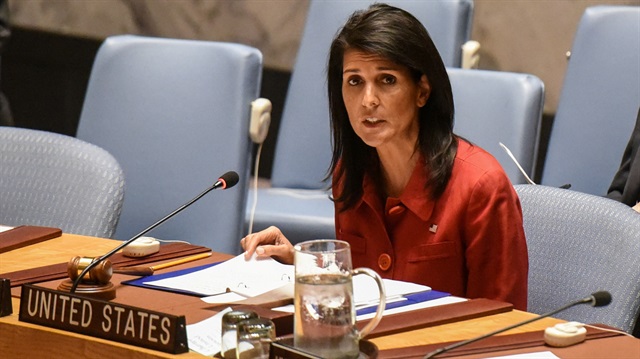
No political solution with Assad in power, Nikki Haley says in break from recent statements
A political solution to the Syrian crisis is not possible while Bashar al-Assad is in power, the U.S.’s envoy to the UN said Saturday.
"There's not any sort of option where a political solution is going to happen with Assad at the head of the regime," Nikki Haley told CNN.
"It just -- if you look at his actions, if you look at the situation, it's going to be hard to see a government that's peaceful and stable with Assad.”
The comments come two days after President Donald Trump ordered military action against the Syrian regime.
Haley told the Security Council on Friday the U.S. was “prepared to do more” following the strike on a Syrian air base in retaliation for a chemical weapons attack in Khan Shaykhun in Idlib province.
The chemical attack that killed at least 100 victims and injured hundreds more marked a turning point in U.S. policy toward regime change in Syria.
Last month, Haley told reporters the Trump administration’s priority was "no longer to sit there and focus on getting Assad out".
Similarly, Secretary of State Rex Tillerson said Assad's future "will be decided by the Syrian people", while the White House said Assad’s retention of power was "a political reality we have to accept".
U.S. media reports have suggested that images of chemical weapons attack victims, especially those of children and babies, played a role in convincing Trump the U.S. needed to take action.
On Thursday, two U.S. destroyers in the eastern Mediterranean fired 59 Tomahawk missiles at the Shayrat Airfield that American officials believe was used the carry out the chemical attack.
The World Health Organization, whose preliminary analysis confirmed the use of a nerve agent in the affected area, has described the attack as the most horrific since the Ghouta attack in August 2013 that killed more than 1,300 victims.
The broader six-year Syrian conflict has resulted in the deaths of hundreds of thousands of people and the displacement of millions.
It has left the Middle Eastern nation in ruins that will take decades to rebuild, and has scarred the psyche of an entire generation.
A UN-mediated peace process in Geneva has yielded few results since 2012, while the Security Council has been hamstrung by Russia, a permanent member, shielding the Syrian regime from international repercussions.



